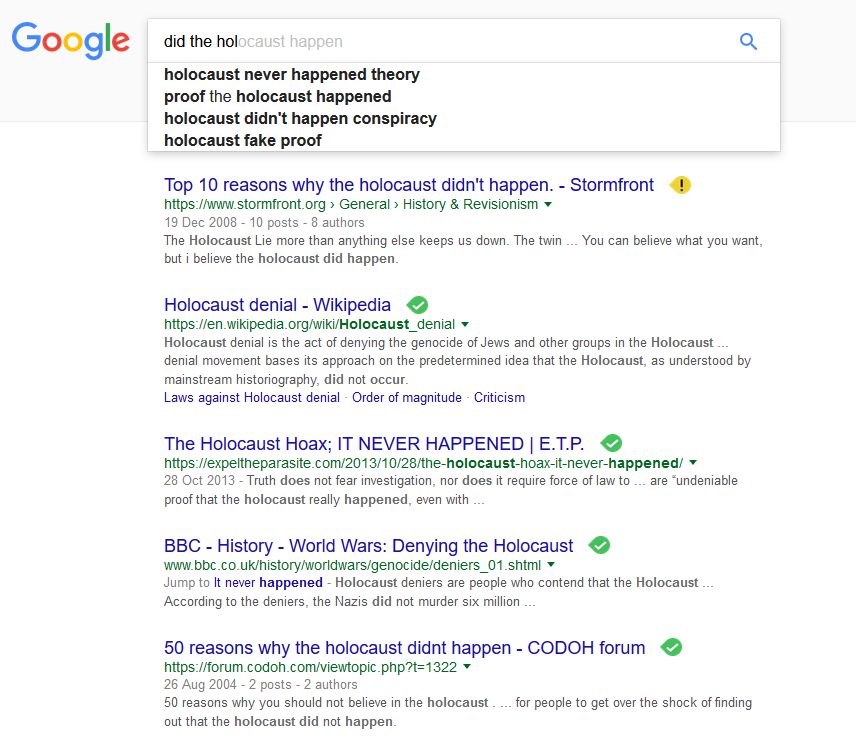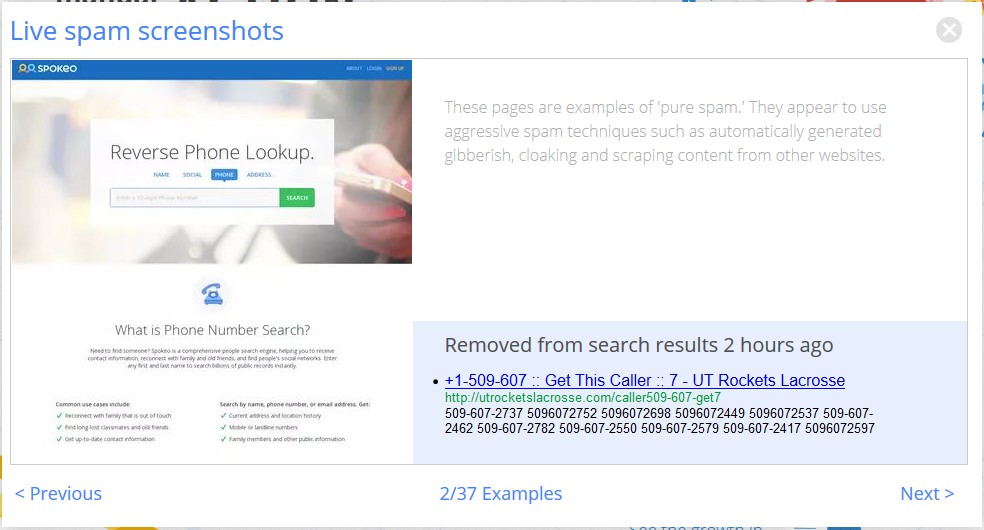The Google algorithm is a true wonder of the modern world. It decides, from the instant a search is typed, what to display in the search results and the order they appear. It works well enough for Google to become a verb and the starting point for any research or homework.
We generally trust what we are getting back from Google (and Microsoft’s search engine Bing), but there are signs that Google may need to adjust its approach due to the hijacking of certain issues.
Fake news and propaganda
We now know about the modern phenomenon of fake news infecting our social media timelines but the Google search results themselves may be vulnerable to similar distortion.
Where there are groups with particular political agenda such as holocaust deniers, a recent Guardian article by Carole Cadwalladr showed how the search results are being distorted to deliver websites with a particular dubious agenda high in the search results..
For example, typing ‘Did the holocaust happen’ into Google will currently show all sorts of dodgy websites from alt-right / neo-nazi groups that attempt to deny the facts or push some alternative apologist theory.
Here, the very same Google algorithm that helps you find a local estate agent or solve a homework problem for your child is being gamed to boost propaganda and false information.
This happens where the perpetrators are organised and know their way around the techniques of search engine optimisation.
So how does this happen? It’s useful to understand a little more about how the Google Algorithm works.
The Google algorithm
The exact nature of the Google algorithm is a closely guarded trade secret, but we know enough about how it works to plan and execute SEO (search engine optimisation) projects for our clients that boost rankings and quality web traffic.
At the time of writing there’s 130 trillion pages indexed by Google and nearly 40,000 searches per second. The Google algorithm sifts through these pages to match the user’s search to the most relevant web page using over 200 ranking signals that decide the order of search results.
Some of these ranking signals include the following:
- Signals that indicate trustworthiness and authority such as good quality backlinks
- Fast loading, well-optimised websites
- Good quality content that is well grammatically correct, spelled properly with images or rich media
- Responsive web design that works for all devices
- Page structure and layout to boost user experience
- Location of business or website owner
When senior Google search engineer Andrey Lipattsev was asked at a webinar about ranking signals he simply cited three: Links, Content and Google Rankbrain.
Links and content are fairly easy to grasp, but Google Rankbrain is relatively new. RankBrain is Google’s name for a machine-learning artificial intelligence system that’s used to help process its search results. This means that a portion of the Google algorithm effectively teaches itself where web pages should be ranked. For example, this is likely to mean a more natural language can be used on websites as Rankbrain understands the search intent of the user better rather than blindly matching keywords in the search with keywords on a web page.
Google fighting spam
Google also works tirelessly to fight spam to keep results relevant and useful to the user. That means web pages will removed automatically from the search results or by manual action by staff if it triggers Google spam monitoring.

Some of the factors that lead to a site being marked as spam include the following:
- Poor quality grammar and spelling
- Links to other dubious websites
- Thin content that is over optimised with keywords
- Presence of viruses and malware
- Scraped or auto-generated content
Generally the Google algorithm works well and most sensible people don’t accept the first answer they get from a Google search. Most people will look for corroborating sources even if all you want to know is Benedict Cumberbatch’s height.
When should Google intervene?
The worry for Google and society as a whole is that it’s currently too easy for search results to get hijacked in this way where there are groups are trying to promote a particular issue. Google steers clear of editorial intervention but sometimes this does occur where there are obvious problems.
When George W Bush was US President, in 2003 some mischievous web users started creating web pages linking his profile on the Whitehouse website using the words ‘miserable failure’.
So many people did this that typing ‘miserable failure’ into Google brought George Bush’s profile back as the number one result. Understandably, Google came under a lot of pressure to change the results and this was their response:
“We don’t condone the practice of googlebombing, or any other action that seeks to affect the integrity of our search results, but we’re also reluctant to alter our results by hand in order to prevent such items from showing up. Pranks like this may be distracting to some, but they don’t affect the overall quality of our search service, whose objectivity, as always, remains the core of our mission.”
They eventually changed the algorithm in 2007 to downgrade so-called link farms and demote the page in search results.
In the world of business, we use the techniques of SEO to help promote our clients’ websites and businesses. We would not promote a business if they made false claims irrespective of how much they were willing to pay.
Those same techniques in the wrong hands can promote an entirely different, often false, political agenda using search engines and websites.
Further reading
Political Google bombs in the 2004 US Presidential elections
Google frames and distorts how we see the world
Google ranking factors by Northcutt
FAQ about the Google Rankbrain algorithm
Three main ranking factors according to Google
Google democracy and the truth





